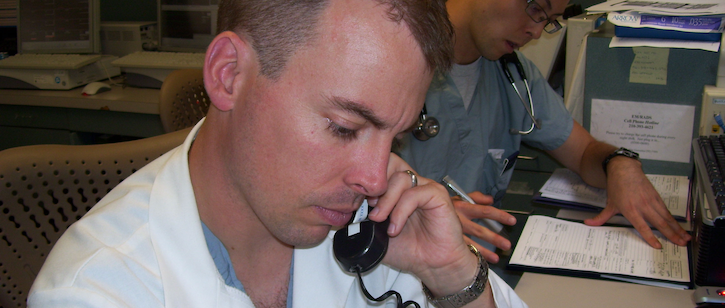Follow-Up Phone Calls Reduce Hospital Readmissions
Pharmacists used the phone calls to monitor medication adherence and help patients manage their medication regime.

Thumbnail and photo above have been cropped and resized. (U.S. Air Force photo/ Linda Frost).
Follow-up phone calls by pharmacists to patients reduced hospital readmission rates by up to 15 percent, according to a study published in the British Journal of Clinical Pharmacology.
Results of the study concluded that 30-day readmission rates for patients who received follow-up calls reduced by 9.9 percent, while 90-day readmission rates reduced by 15.2 percent.
The calls also led to two less days in the hospital following potential readmission and resulted in a self-reported better understanding about the importance of medication adherence.
>> READ: Digital Drug Monitoring Cuts Hospitalizations for Patients with Asthma
Senior author lead James C. McElnay, School of Pharmacy at Queen’s University Belfast in the U.K., along with his research team, implemented pharmacist-led, post-discharge telephone follow-up calls to evaluate its impact on rehospitalization in polypharmacy patients.
The team recruited 211 adult patients who were receiving at least 10 prescribed medicines for the management of chronic illness. A majority of the patients (66.4 percent) were older than 65 years old.
Pharmacists involved were asked to communicate with patients who received phone calls three times — within 10 days, at one month and the start of the third month post discharge. The pharmacists followed a guide during interactions with patients according to the principles of medicine optimization.
During interactions, the pharmacist recorded issues or problems patients were experiencing with their treatment or illness.
Interactions included discussions about drug adherence and concerns patients had regarding their medications, while the pharmacists assessed patients’ ability to manage their medication schedule and help patients overcome adherence barriers.
All interventions were documented within subgroups: medication adherence, health promotion, adverse event management, medical related challenges, medication supply/ getting prescriptions, over the counter products and patient self-evaluated health status.
Those who received follow-up phone calls had to complete three questionnaires during the study. The Medication Adherence Report Scale and the patient Beliefs about Medicines Questionnaire assessed the patient’s self-reported adherence and perceptions about medication before discharge and at three months post discharge. Patients also were sent a satisfaction survey.
Participants did not receive a call or got one, two or three.
The number of phone calls received were based on the Charlson comorbidity index, age and sex and propensity score that was a result of the number of medicines taken, length of hospital stays and primary diagnosis.
Of the 211 participants, 51 did not receive a call, 12 received one call, 16 received two calls and 131 received the full protocol of three calls.
For the group that got phone calls, the odds of readmission within 30-days were reduced by 43 percent and in 90-days by 47 percent. And for the patients who received three phone calls, 30-day readmission reduced by 78 percent and 90-day by 66 percent.
Along with a reduction in readmission and length of hospital stay upon readmission, the intervention reduced healthcare costs.
The post-intervention questionnaires revealed that the follow-up calls had positive effects on patient beliefs about medicines, medication adherence and patient satisfaction.
This is just another recent study that shows patient satisfaction in telehealth services for follow-up care, showing that the industry and society are becoming more responsive with the implementation of this technology to improve patient outcomes.
Get the best insights in healthcare analytics directly to your inbox.
Related
Vascular Surgery Patients Satisfied with Post-Surgical Telemonitoring
The Clinical Divide: Leveraging Telemedicine to Treat Mental Health
How UPMC Is Bringing Enhanced Telemedicine Services to the Grocery Store